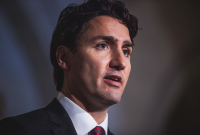Support strong Canadian climate journalism for 2025
Hundreds of people gathered at the White House for an anti−pipeline protest Tuesday that hints at an aggressive upcoming challenge against the Keystone XL pipeline, despite its support from the new U.S. administration.
The crowd descended upon the presidential residence hours after Donald Trump signed executive orders aimed at facilitating the construction of two pipelines.
The protesters chanted slogans, held up signs like, "You can’t drink oil," and, "Keep It In The Ground," and vowed to fight both pipelines including the one proponents would like to build from Canada to refineries in Texas.
One organizer said the fight is about to become even tougher than it was in its initial phase, when years of pressure from the left prompted Barack Obama’s administration to freeze the project.
Anthony Torres of the Sierra Club said the anti−pipeline movement knows it has no potential ally in the White House now. It won’t even bother convincing Trump, as it did Obama. He said the resistance will unfold in three places: the street, the courts, and at the lower levels of municipal and state government.
"The tactics are different," Torres said. "You’re going to see much more aggressive lawsuits. Much more protests and tension on the streets. You’re going to see much more resistance in the communities directly impacted. And also much more attention to other officials and local and state governments."
He brushed off a suggestion that stalling every pipeline could have unwanted political consequences for his movement. In his own country, areas in Ohio and Pennsylvania that collect fossil fuels swung massively away from the Democrats, helping to elect Trump.
In Canada, a Liberal government was elected on a promise to take action on climate change, and get pipelines built. In addition to all that, the U.S. State Department has concluded that Keystone could actually reduce greenhouse gases compared to oil transport by rail.
On the political predicament of Prime Minister Justin Trudeau, Torres was unsparing: "We know that true climate leaders are for all efforts to stop fossil fuels. There’s no such thing as a middle pathway. You have to be against pipelines."
In Washington, some officials advising the last Canadian government encouraged the Harper Tories to take more aggressive action on climate change — not because it would ever win over large environmental lobby groups, but because it would win sympathy from political moderates, and isolate the protesters: "You marginalize those groups," one official said, before the last Canadian election.
Yet the protest movement is actually now seeing a burst of energy following the election of Trump. The clearest examples were the massive marches that had millions in the streets of U.S. cities last weekend. Torres said his own organization has seen donations surge since the election.
As if to illustrate the point, a separate protest Tuesday evening, this one against racism, arrived outside the White House while the first one was still going on.
In the middle, Marc North was holding up a sign that said "Stop Keystone XL." Perched on his bicycle, he said he sold his car in 1999 and says he’s convinced people need to consume less; scale back their energy use; and socialize the use of energy products.
He’s not especially optimistic about what comes next.
"I’m hoping there’s going to be an awakening," North said. "I think it’s going to be a big fight."





Comments